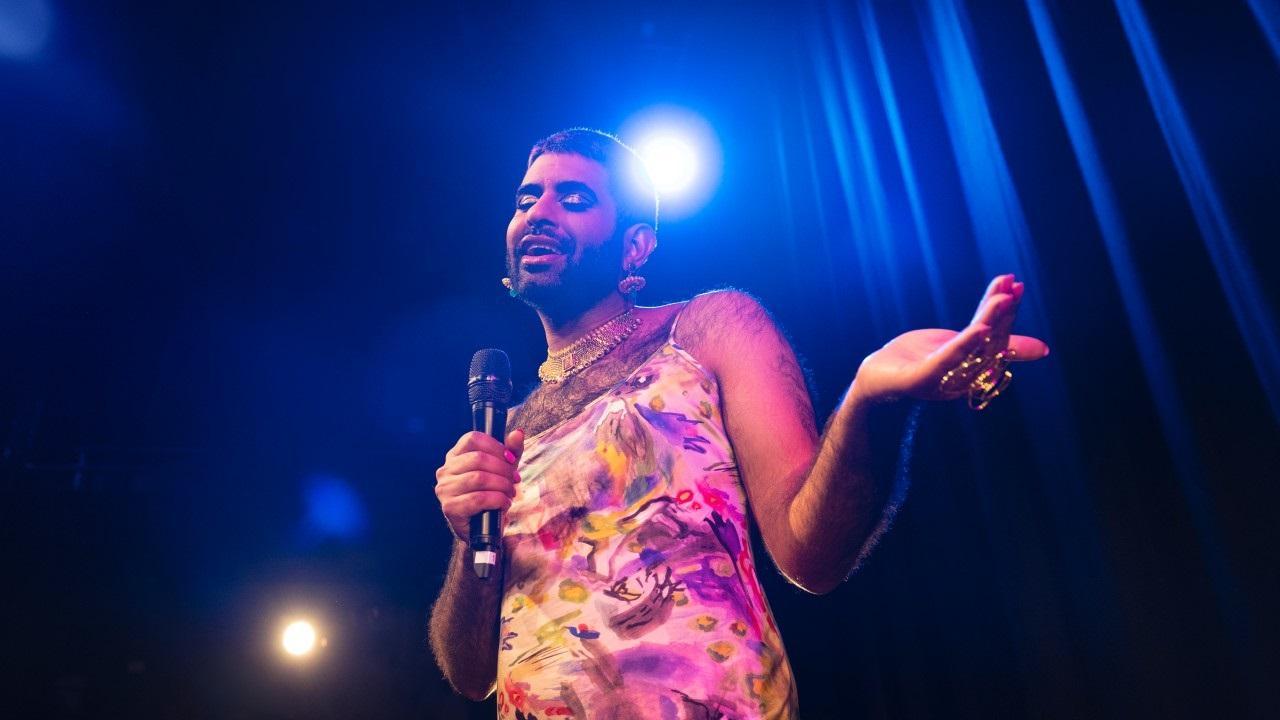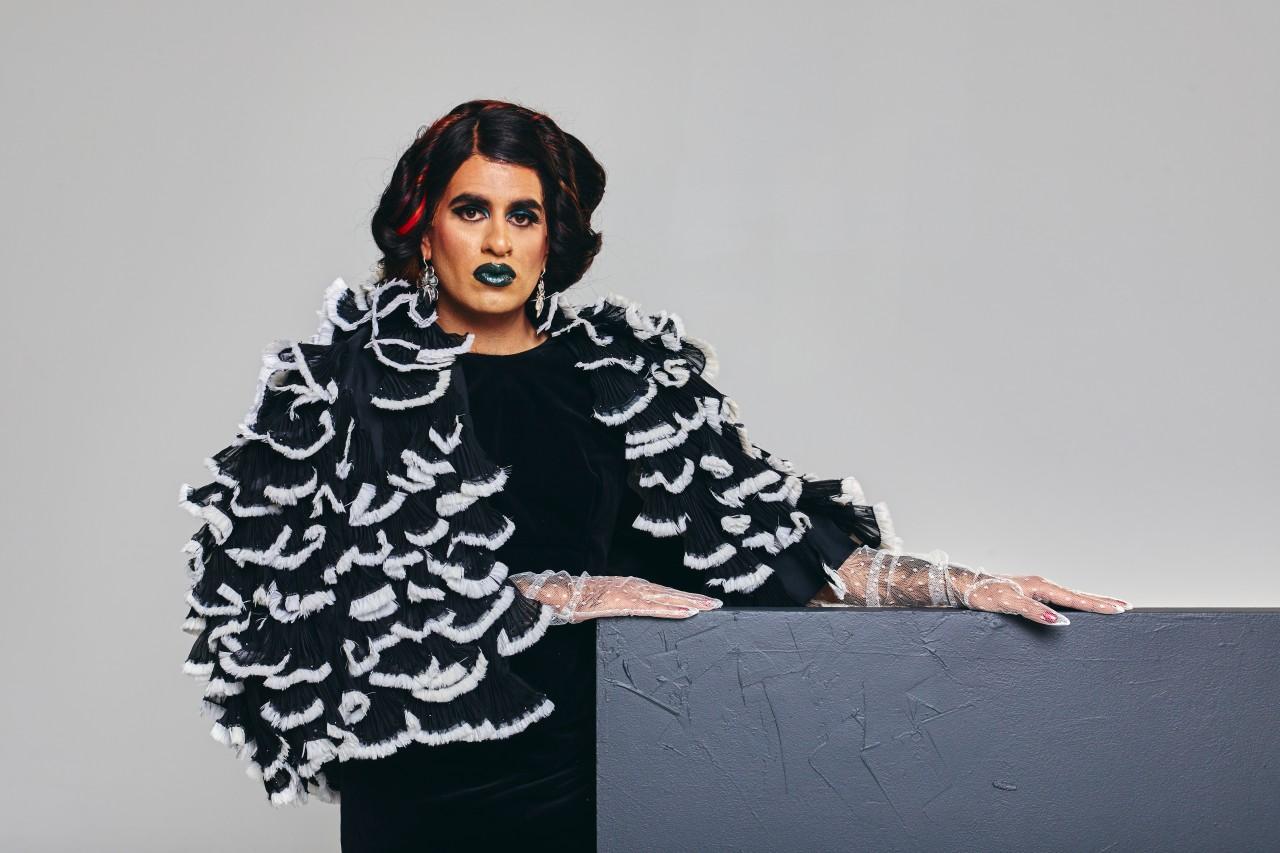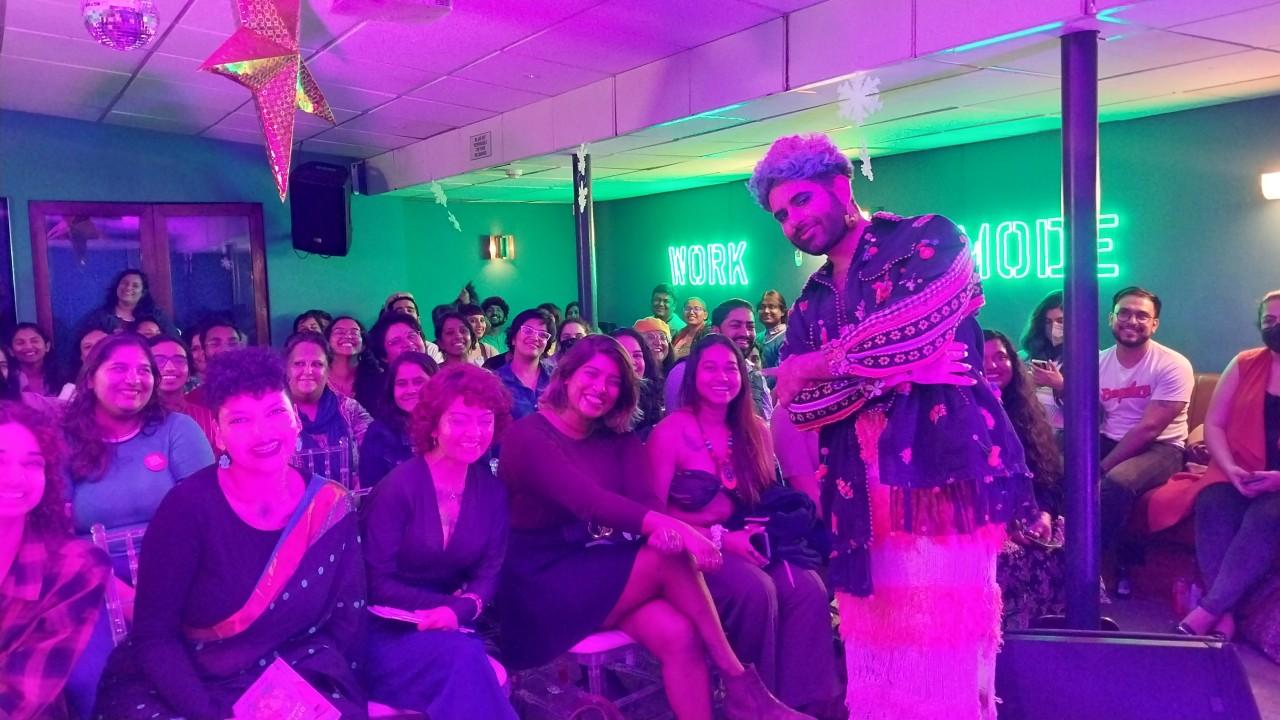Internationally renowned gender non-conforming writer and performance artist, Alok Vaid-Menon returned to perform across India. In an exclusive chat, they talk about living authentically and artfully, response from Indian audiences, and the need for spaces which allow us to exist as ourselves

Performing comedy and poetry, Alok Vaid-Menon fascinated Indian audiences, and created space which is often elusive. Photo courtesy: Alok Vaid-Menon
Author, poet, comedian, and public speaker—Alok Vaid-Menon dons many hats, and fabulously so. Vaid-Menon identifies as gender non-conforming (they/them), and is an advocate of bodily diversity, de-gendering of fashion, and self-determination which is explored in their books—Femme in Public (2017), Beyond the Gender Binary (2020), and Your Wound/My Garden (2021). Vaid-Menon’s art delves into lived experiences, and themes of belonging, and trauma that shape queer identities. It will not be a stretch to say that through their books, performances, and social media presence they have created an educational space by offering the language to self-identify, reflect, and even intervene as allies.
Vaid-Menon has toured in over 40 countries, and has been performing across India over the past few weeks. Their unapologetic humour, and poignant poetry supported by diverse artists translated into cultural spaces where a unique blend of comedy, poetry and music captivated audiences, from Mumbai to Manipur. In an exclusive chat, Vaid-Menon shares their approach to art, motivations, experiences on tour, and freeing oneself from societal biases.
How would you describe the evolution of your queer identity?
Over the years, various terms and labels have resonated with me as means to describe who I am. But now, I feel these words conceal more than they reveal. For me, queerness is less a category, and more a choreography. A way of navigating the world that appreciates complexity, simultaneity, as well as infinity. Gender and sexuality are ultimately irreducible to language because being human transcends categorisation. That’s the joy of being alive.
How does your desi-ness inform your art and advocacy?
South Asians, wherever we go, carry history. All these histories, all these presents, all these futures live on in and through me both in ways that I’m cognisant of, and in ways that I’m still discovering. I wouldn’t make the art I do, I wouldn’t be the person I am, if I wasn’t South Asian.
You’ve toured across the globe – from Africa to Asia – and interacted with the diverse queer community. What is the one glaring similarity and dissimilarity you’ve found?
People across the world are lonely. It’s an international crisis, this loneliness. Often people ask me if there are people “like me” across the world (trans people, non-binary people, etc.), but I think it’s more honest to say that people like us are people who share the same pain, not necessarily the same presentation. The world over I see so much pain. A deep rupture between how the world expects people to be, and who they actually are.
In the US so much of my work is about having to “prove” that non-binary people are not some new-fangled millennial or gen-z phenomenon. What I’ve noticed consistently in other places across the world is that communities understand that there have always been people outside of the western gender binary. They may not like them, but at least they understand that they exist.

Alok Vaid Menon has been creating waves across the world for creating educational spaces through their work, and furthering the dialogue around degendering, and bodily diversity. Photo courtesy: Alok Vaid-Menon
Also, how differently is your work received?
There is no one kind of audience, be it Indian or Western. I find my ideal audience in the places I go: people who are curious, loving, engaged. That’s the beauty of art, I think. It connects us. Despite everything, it brings us together. It assembles an “us”: a motley crew of people who look and think differently, but who find common ground.
Your India tour is being organised by Kommune. How has your experience been finding partners with similar sensibilities?
I’ve been an internationally touring artist for over a decade, and I’ve experienced the ins and outs of the industry. I know a good partner when I work with one. Kommune first invited me to perform at Spoken Fest in Mumbai in 2019 and I had such a wonderful time. It was a no-brainer to work together again on this trip.
Any insights you’d like to offer about Indian audiences?
Audiences vary in regions but one overwhelming sensation is that there is an essential need for space in which people can experience the fullest extent of their grief. To just go and cry in public. And for no one to tell you to stop. There are few things more beautiful and meaningful than that.
In the face of all the bigotry and violence – online and offline – what motivates you to create, and be your authentic self on public platforms?
I spent the first 18 years of my life dissociated and separated from who I knew I was because I was prioritising other people’s projections of who I should be. I was merely existing, not living. It was a hollow life. I don’t ever want to go back to that. I made a promise to myself to live authentically and artfully. It’s difficult, but at least I can feel that discomfort. At least I’m present in my body for it. Back then I wasn’t capable of feeling anything. I suppose feeling makes it worth it. Feeling makes us human. And I love humans so much. Love is my propellant.
In the absence of art, and media that fails to represent LGBTQIA+ individuals, queer creators, and performers often end up creating space that they hoped existed. Is there a criticality that you associate with your voice? Could you outline the relevance and subsequent impact of your work?
As artists, if we fixate on our impact, it sabotages our creative practice. My job is to be able to write, speak, and perform beautifully. To do that, I have to be present and rooted in this moment in my life. What I’ve found is that when I dwell on other people’s reception of me –negative and positive – it’s extraordinarily difficult for me to create art. My art is me getting curious with myself. It’s a meditative practice, and something that I have intentional boundaries to do successfully.

Alok has toured in over 40 countries, and the recent concluded tour took them across five cities in India where they engaged with a diverse LGBTQIA+ community and allies. Photo credits: Kommuneity
Self-expression is a battle queers fight everyday in a world that polices bodies that do not conform to the socially accepted binaries. We are often too femme, or not femme enough. What would you want to say to those who are made to feel like they are too much? How does one unlearn what is so deeply ingrained?
We keep climbing trees with the promise of sweetness, but the trees bear no fruit. We keep scaling ladders that go nowhere. All the rules we’re told about how we are supposed to look are made up. They keep us perpetually striving and aspiring towards something that can never be realised. We need to redirect that energy to cultivating internal peace, instead of seeking external validation. That’s the most sustainable renewable resource. It’s some of the most challenging work, but that’s why we have art. We are all rough drafts. Art undoes us, and then remakes us.
Do you believe comedy can become a vehicle for sensitisation, especially in repressed societies?
I noticed a disconnect between the stand-up I was seeing in mainstream venues and the comedy of my friends’ group chats, the comedy that helps my queer community survive. I didn’t think that the jokes we were making were ‘comedy’ because I didn’t see people who looked like us doing it. And then I started to experience comedy by queer and trans people and it changed my life. It gave me permission to have fun, centre my joy and be unruly. ‘Education’ and ‘entertainment’ are another false binary that I hope to disrupt with my career. Learning can be fun, and sensational.
In a 2013 Ted-talk speech, you challenged what we view as success and the damaging impact it perpetuates by affirming the status quo. You called success an epidemic and yourself a professional failure. How would you describe what you’ve found now?
Wow that’s a flashback! I still believe the way that we acknowledge and quantify success is flawed. The most successful things I’ve accomplished in my life aren’t the ones I’ll receive formal recognition like accepting myself, cultivating meaningful friendships or choosing love over fear.
Also Read: Transgender Awareness Month: Dating as a gender queer person in India
 Subscribe today by clicking the link and stay updated with the latest news!" Click here!
Subscribe today by clicking the link and stay updated with the latest news!" Click here!








